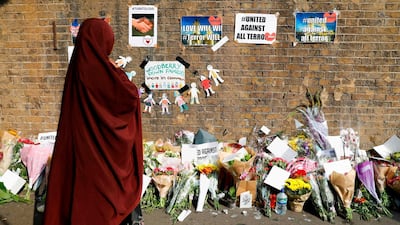Britain's counter-terrorism police are investigating several letters calling for violence against Muslims on a "punish a Muslim" day next month.
The letters, which were received as far afield as Bradford, Leicester, London, Cardiff and Sheffield, suggested a number of ways Muslims could be targeted on April 3, as well as points to be awarded for different acts.
"They have hurt you, they have made your loved ones suffer. They have caused you pain and heartache. What are you going to about it?" read one.
It suggests 10 points for verbally abusing a Muslim, 1,000 points for bombing a mosque and 2,500 points to “nuke Mecca”.
Photos of the letters were shared widely on social media, and drew strong criticism from officials. Counter-terrorism police said they were treating the letters as a possible hate crime.
Miqdaad Versi, assistant secretary general of the Muslim Council of Britain, said the letters were indicative of wider trends.
"Sadly, it is reflective of hate against Muslims which continues to manifest itself alongside the rise of the far right. Our elected officials need to stand up and take action against Islamophobia in the same way they have taken action to counter bigotry against other groups."
Tell MAMA, an organisation which monitors anti-Muslim hate crime, said the letters were being treated with "the utmost seriousness".
"We urge anyone who has received this letter to report to us in confidence or to ring the non-emergency 101 number," it said on its website.
"It is essential that all letters and envelopes are kept and handled minimally to preserve evidence for the police to investigate."
_______________
Read more:
UK extremists must be denied the space to spread hatred
UK’s first festival of Muslim culture to challenge Islamophobia
Hungary’s Muslims fear fallout from anti-Islam rhetoric
_______________
Labour MP Yasmin Qureshi tweeted: “I’m shocked to learn that extremist cowards are distributing anonymous letters encouraging people to attack Muslims.”
One letter was sent to the business address of Liberal Democrat councillor Riaz Ahmed in Bradford. "It was not addressed to anyone, just the address and postcode as if it was sent out randomly," he told The Yorkshire Post.
Britain's Counter Terrorism Policing Network (CTPN) said on its website it was "investigating a number of reports of potentially malicious communications sent to individuals across the UK".
"Counter Terrorism Policing North East are co-ordinating the investigation at this time and will consider any potential links to existing enquiries."
West Yorkshire Police said it had received six reports while South Yorkshire Police said it had received three, the BBC reported.
A Metropolitan Police spokesman said it had received two reports of letters being sent to people, one in east London and the other in the SW4 area.
Tell MAMA quoted the assistant chief constable of the South Yorkshire Police, Tim Forber, as saying the threatening letters were being investigated and details would be forwarded to the counter-terrorism police.
“These communications are extremely distressing and we appreciate that members of our communities will be very concerned," Mr Forber said.
“I can assure you that these documents are being taken extremely seriously and a thorough investigation into the circumstances is under way.
“I would like to reassure the people of South Yorkshire that public and community safety remains our utmost priority and as always, we are doing everything we can to ensure the safety of everyone.
“Hate crime in any form will not be tolerated and we will work with our communities and alongside our colleagues in the counter-terrorism unit to ensure that those spreading fear and hatred will be brought to justice.”

